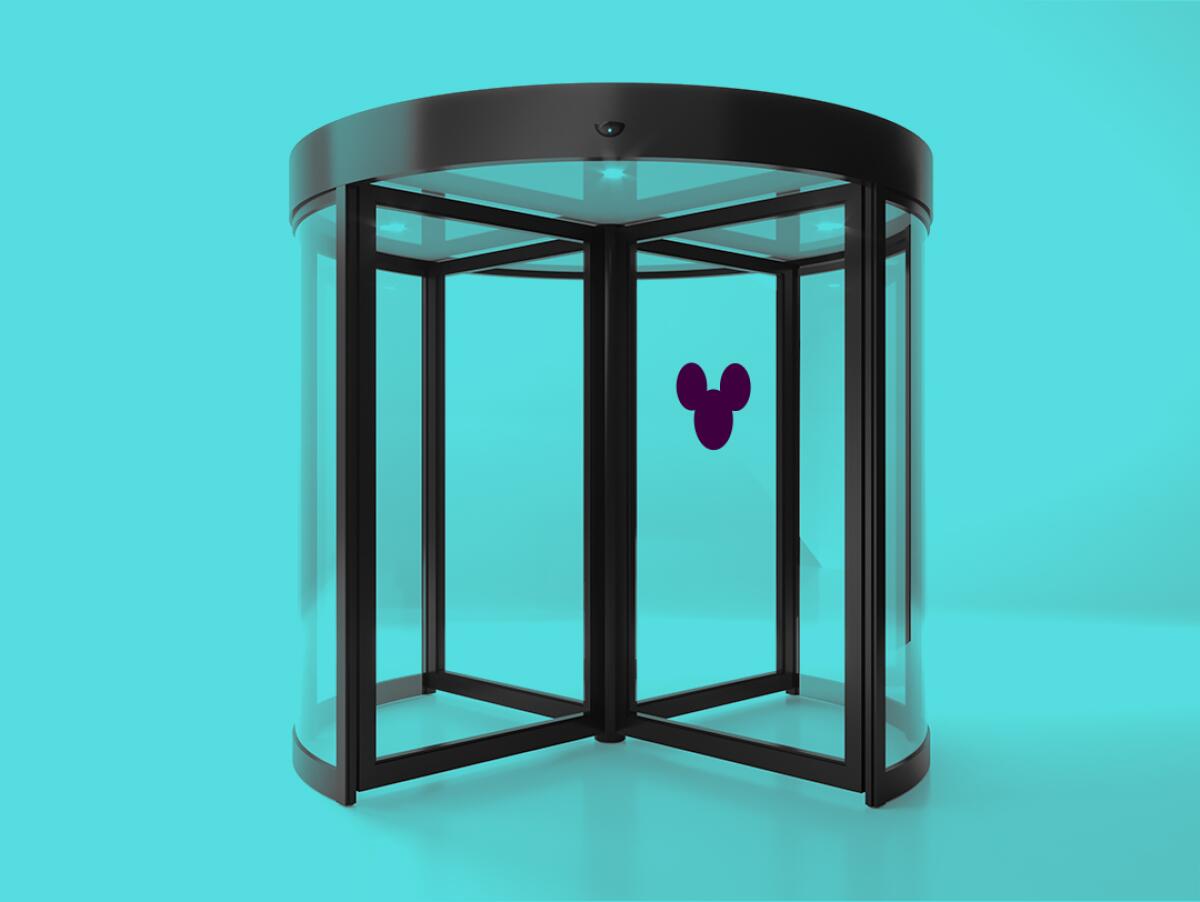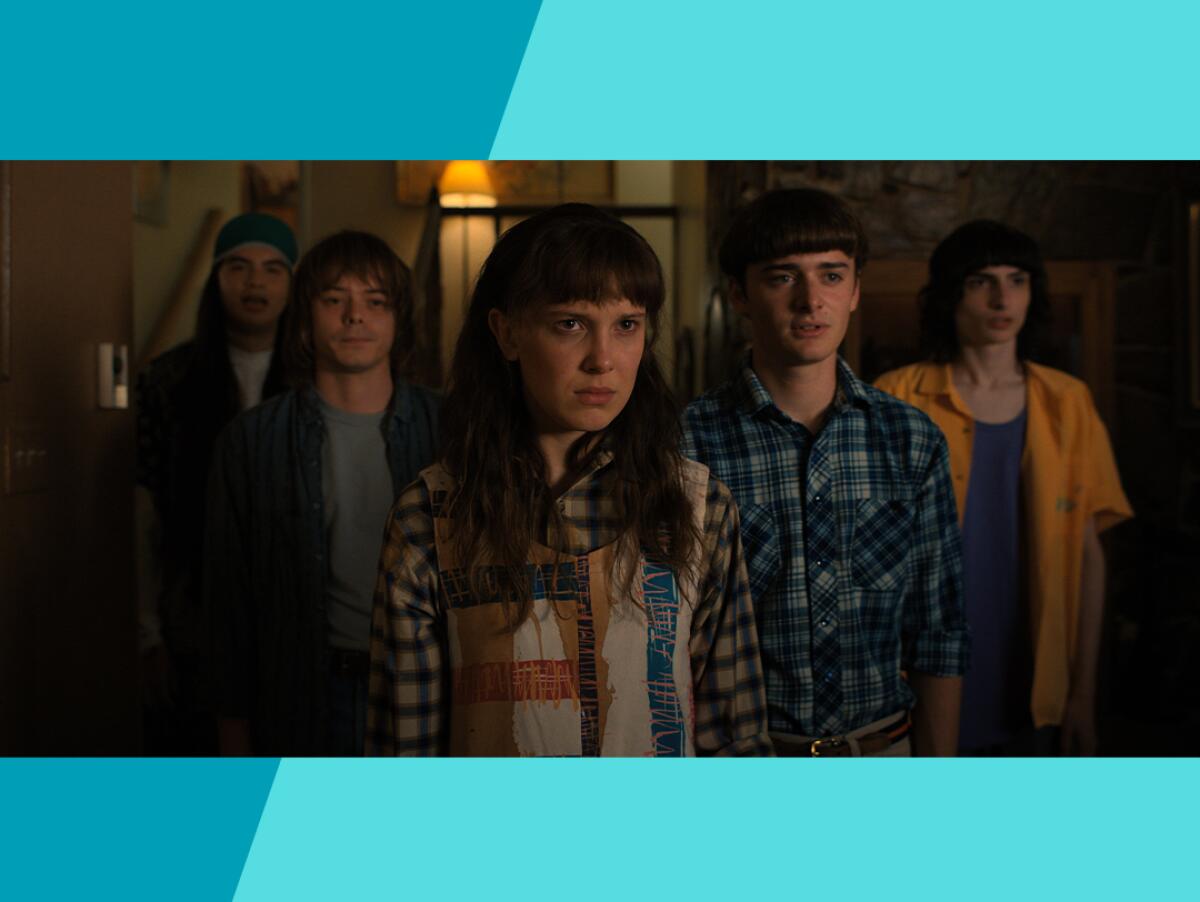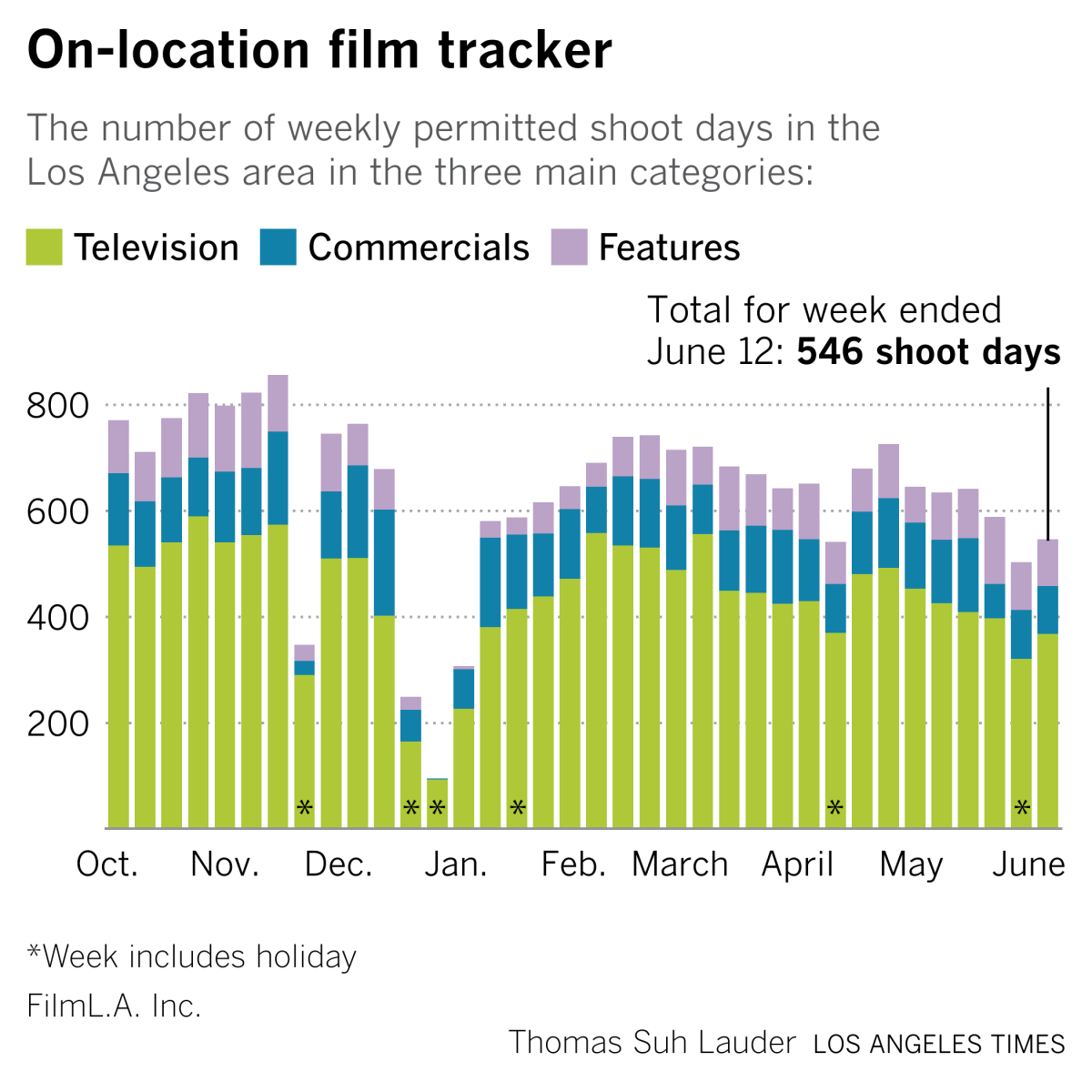Streaming vs. indie cinema? An art house film service finds a way to support both

- Share via
This is the June 14, 2022, edition of the Wide Shot newsletter about the business of entertainment. If this was forwarded to you, sign up here to get it in your inbox.
Streaming services and movie theaters are often portrayed as opposing forces on the fast-changing media battlefield.
But for film buffs, that’s not necessarily the case.
At least that’s the argument from one art house film streamer, which is using its cachet with cinephiles to bring more attention to critical darlings and foreign gems playing in the nation’s smaller movie houses that have been struggling to recover from the pandemic.
The company, Mubi, which charges $10.99 a month, has been rolling out a membership program that allows customers a chance to see a movie in theaters every week for no additional charge. The service , called Mubi Go, previously launched in Britain, India and New York. Mubi Go debuts in Los Angeles on Friday with the release of Apple’s Sundance Film Festival acquisition, “Cha Cha Real Smooth,” which will stream simultaneously on Apple TV+.
Subscription services are no longer novel for the cinema industry, where the major chains — AMC, Cinemark and Regal — all have their own programs with various ticket pricing schemes and discounts on snacks. But rather than the all-you-can-watch MoviePass model, Mubi picks which film members can see in theaters, and partners with specific cinemas where patrons can redeem their tickets.
“Oftentimes, some of the best things don’t have huge marketing budgets behind them,” said C. Mason Wells, Mubi’s director of U.S. distribution. “These are movies that maybe you haven’t heard of before. But if you trust us and our curatorial vision, you’re going to be surprised more often than not by what we offer.”
In Los Angeles, Mubi will offer tickets to “Cha Cha Real Smooth,” starring Dakota Johnson and directed by costar Cooper Raiff, at Laemmle Theatre’s Monica Film Center, Glendale, NoHo 7 and Town Center 5 locations. Wells expects to have the vast bulk of L.A.-area independent cinemas participating when all’s said and done.
The Mubi program rolled out in New York last year with theaters including Film at Lincoln Center, Film Forum and IFC Center, and featured titles such as Oscar winners “Drive My Car” and “The Power of the Dog.”
The idea is to boost attendance for certain movies that don’t have the studio-backed marketing extravaganzas or the kind of pop culture awareness that helps blockbusters like “Top Gun: Maverick” and “Jurassic World Dominion” dominate ticket sales. While the AMCs and Regals of the world play some independent movies too, Mubi wants to direct fans to the mom-and-pops.
Wells — who previously worked at film distributor Kino Lorber and helped relaunch the Quad Cinema in New York — also sees it as a way to get younger people out to art house cinemas, which have typically been the domain of the over-40 crowd. About 80% of Mubi Go users are 44 and under. “That is not the traditional art house movie demographic in the United States,” he said.
After establishing itself in Los Angeles, Mubi plans to continue the program’s expansion in cities including Chicago and Portland, Ore., following a pattern similar to the “platform release” of an indie film, in which a distributor starts in the biggest locales and spreads out to other parts of the country as momentum builds.
There are plenty of streaming services that specialize in independent cinema and documentaries, including Kanopy and Fandor, even since the demise of FilmStruck, which was killed by WarnerMedia under AT&T for being too “niche.”
In that universe of offbeat streamers, I’ve always thought of Mubi, which has 10 million members worldwide, as one for film lovers who find even Criterion Channel too mainstream.
Mubi’s film-a-week method builds on the highly selective ethos of the streaming service. Rather than lay out a full smorgasbord of options, Mubi takes a curatorial approach to streaming, promoting a movie a day to its subscribers. On offer Monday was “The Demons of Dorothy,” a 29-minute French film that the company’s blurb describes as “a cross between John Waters and Ryan Trecartin.”
The single-movie approach is a way to counter the problem of subscribers being paralyzed by the number of options on the bigger streaming platforms, a phenomenon identified in other contexts by psychologist Barry Schwartz in the 2004 book “The Paradox of Choice.” While the biggest streaming services want to be Walmart, Mubi and Mubi Go are more akin to an exclusive book club or wine delivery service.
The postpandemic recovery has been an uphill trudge for art house theaters and smaller chains. During government-mandated closures, digital distributors such as Kino Lorber did what they could to support theaters by setting up “virtual cinema” screenings, basically digital rentals that allowed local cinemas to make a little money while their doors were closed.
But the shuttering of the business continues to have ripple effects, even in big movie towns. In Los Angeles, the Landmark on Pico Boulevard closed last month after 15 years in business. Landmark Theatres picked up the lease at Pasadena’s Playhouse 7, previously operated by Laemmle. The former ArcLight in Hollywood remains closed and the Vista in Los Feliz is shuttered for renovations.
A comeback for indie cinema will depend on more movies being released in theaters. Streaming services such as Netflix and Apple TV+ have shown a growing interest in putting their festival selections, as well as their expensive blockbusters, on the big screen, recognizing the cultural clout that a theatrical campaign has compared to dropping a prestigious movie into the online void of infinite choice.
Mubi is hoping to accelerate the return, believing that streaming and theaters are not competing in a zero-sum game any more than VHS tapes and Blu-ray discs cannibalized Hollywood’s traditional business. People who stream the most content online also tend to be the most frequent moviegoers, and vice versa, according to a 2020 Ernst & Young survey commissioned by the National Assn. of Theatre Owners. Those who streamed the most — 15 or more hours of content a week — were the most likely (35%) to go to the movies nine or more times a year.
“These things work together and talk to each other and don’t have to cannibalize each other,” Wells said. “That’s at the heart of what we’re trying to do.”
Disney drama

At Walt Disney Co., being tagged in the press as a potential successor to the CEO is a little like joining Spinal Tap and getting handed a pair of drum sticks.
The firing of Peter Rice, the former 21st Century Fox executive (and a Rupert Murdoch favorite) who ran TV content operations at Disney since the 2019 acquisition, was sudden and unexpected.
In a meeting that lasted less than 10 minutes, Chief Executive Bob Chapek told the respected executive that he wasn’t a good fit for Disney’s culture. He was replaced by Dana Walden, Rice’s successful lieutenant whom Chapek viewed as more of a team player.
Disney Chairman Susan Arnold’s statement, issued concurrently with Rice’s ouster, was widely interpreted as a message that, after two years of operating in Bob Iger’s shadow and the recent misadventure in Florida politics, Chapek has the support of the board, at least for now.
Insiders were taken aback by the blunt way that the shake-up was handled. But it’s not as if such palace intrigue at Disney is unique to the Chapek era. Potential CEOs in waiting were never safe during Bob Iger’s various rounds of succession planning. Tom Staggs was purged from the No. 2 position, and Kevin Mayer left to run TikTok after being passed over.
More stuff
— How Batman and Scotland Yard are helping Spotify move beyond Joe Rogan fallout. Spotify podcast executives unveil their plan to take the company to its next stage of growth, Wendy Lee writes.
— Jan. 6: Must-see TV? The investigation into the Jan. 6 insurrection became a TV event even as Fox News disparaged it, reports Stephen Battaglio. The committee’s prime-time opener drew 20 million viewers.
— After his son died on a USC film shoot, a father is still looking for answers. The father of a Chapman University student from China said he was frustrated at the response to his son’s death, believing that more should have been done to prevent such an accident, reports Anousha Sakoui.
— Headlines, headlines, headlines: ‘Jurassic World 3’ rules the box office: ‘Dinosaurs may not be extinct after all’. UTA acquires U.K. group Curtis Brown to tap into global opportunities for stars. Sexual assault suit against former ABC News executive Michael Corn is dismissed.
— Also: Karina Longworth, host of the “You Must Remember This” podcast, has been doing a major series on the business of the Hollywood erotic thriller, including a recent episode on “Fatal Attraction.”
Number of the week

Summer blockbuster season isn’t just for movie theaters. It’s also on streaming.
Netflix’s “Stranger Things 4” generated 621.8 million viewing hours during its first two weeks of release, making it the service’s third most-watched English-language original series yet. It stands behind just the 28-day viewing numbers of the second and first seasons of “Bridgerton,” which had 656.3 million and 625.5 million hours, respectively.
That’s not quite as impressive as it sounds, when compared to the company’s non-English language shows, which is another story when it comes to total viewership. “Stranger Things” would have a long way to go to catch up to “Squid Game,” for example, which drew 1.65 billion hours of viewing from its first four weeks of release.

But still, two weeks in, “Stranger Things” is producing huge numbers for Netflix, and further cements it as a powerful franchise for a company that certainly needs more of those. This doesn’t fix Netflix’s problems, but it represents some badly needed good news for the Los Gatos company as the service expects to lose 2 million subscribers this quarter.
Not to be left out, Disney+ has its own summer hit with “Obi-Wan Kenobi,” which the Mouse House says earned its streamer its most-watched premiere to date.
Hollywood production
On-location shoot days were up last week, according to the latest data from FilmLA.

Finally... an American dream
I devoured “George Carlin’s American Dream,” the two part HBO documentary on the groundbreaking comedian directed by Judd Apatow and Michael Bonfiglio.
The series charts Carlin’s transformation from his days as a suit-and-tie variety show guy to his embrace of his role as a counterculture spokesman, all the way through his darker late-period renaissance.
Watching this in the context of modern-day comedy debates is enthralling. Carlin didn’t always “punch up,” but throughout the documentary, Carlin shows what real courage in comedy looks like.
Inside the business of entertainment
The Wide Shot brings you news, analysis and insights on everything from streaming wars to production — and what it all means for the future.
You may occasionally receive promotional content from the Los Angeles Times.




